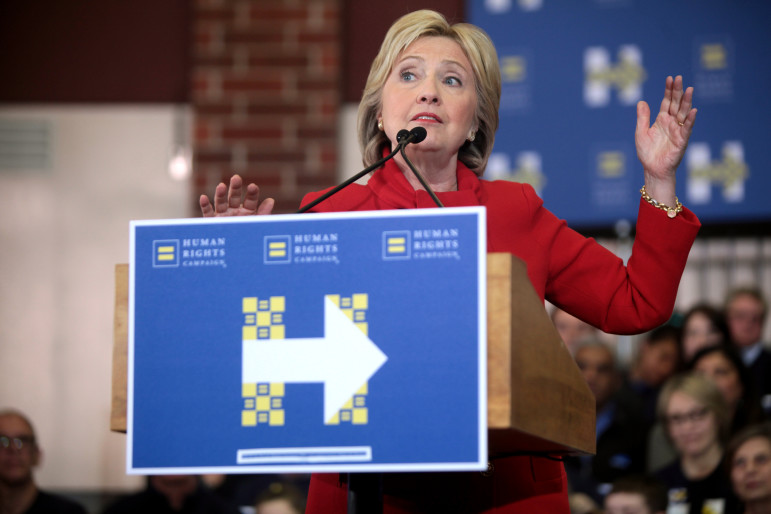
Gage Skidmore
Former Secretary of State Hillary Clinton has released a $25 billion housing plan that appears to be the most detailed outline issued by any of the candidates still in the race.
Sen. Bernie Sanders tends to speak rather broadly about threats to the U.S. working class, but in his visit to St. Mary’s Park in the Bronx last week, he zeroed in on the anxiety that drives all others in New York City—mentioning housing at least three times during his twilight speech.
“There is no reason in this country why people should be paying 40 or 50 percent of their limited incomes in housing,” Sanders said. He later pledged, “we are going to build affordable housing,” before specifically addressing the economic worries of black families, noting that, “They are tired of paying half of their income for housing. They want and I want major investments in inner cities throughout this country.”
Federal policy is elemental to virtually every aspect of the provision of housing in the United States, from federal tax credits and HOME funds used to build affordable housing, to federally funded Section 8 and public housing, to McKinney-Vento funds for homeless shelters, to the Federal Housing Administration and mortgage-interest deduction that play a critical part in the private housing market. And from the FHA’s New Deal-era racism to the more recent role of so-called “government-sponsored enterprises” Fannie Mae and Freddie Mac in the 2007-08 financial crisis, federal policy or lack thereof sets the stage on which many of today’s most pressing policy debates take place. Yet housing has received relatively little attention in candidate debates so far.
What will the 2016 race mean for New York City … and what role will the city play in the race? Join Rep. Anthony Weiner, Fordham’s Christina Greer, Baruch’s David Birdsell, CUNY’s Steven Romalewski and campaign surrogates for a lively discussion on Thursday, April 14, at 6 p.m.—just before the Democratic debate! RSVP here.
* * *
His St. Mary’s speech aside, Sanders has provided fewer details about his housing plans than has former Secretary of State Hillary Clinton. The Sanders campaign didn’t respond on Thursday to a request to see a housing position paper. The affordable housing creation to which Sanders refers appears to fall under his $1 trillion, 10-year infrastructure initiative. If Sanders record in office is any clue, Slate found that as mayor of Burlington in the 1980s Sanders pioneered affordable housing policies that remain effective more than a quarter century later.
Clinton in February released a housing policy plan totaling $25 billion in spending. She advocates making section 8 vouchers easier to use in a wider array of neighborhoods, providing more—and more flexible—funding to cities fighting blight, and down-payment assistance in the form of a match of up to $10,000 for low-income families. The former New York senator also wants to increase the supply of tax credits and have cities bid for the extra help.
Clinton doesn’t explicitly talk about support for public housing in her policy paper, although she does call for expanding the Obama administration’s Choice Neighborhoods program, which is supposed to provide comprehensive support to communities anchored by public housing. Former candidate Martin O’Malley, whose poor performance at the polls belied an ambitious and detailed policy agenda, made specific mention of public housing in his fairly detailed urban and housing policy paper.
As so often happens with policy topics uniquely important to cities, housing is getting short shrift this campaign season because of the geographic and ideological polarization that characterizes national politics. Although the BlackLivesMatter movement and the Flint water crisis have drawn more than the usual amount of light to urban issues like policing and infrastructure during the 2016 race, Democrats win so reliably and by such large margins in cities that they need do little to compete for that vote. (Politico has reported on a push by New York City pols and advocates to change that.)
Republicans, on the other hand, fare so poorly in cities that they all but write them off electorally. What’s more, the party’s intellectual cornerstone is the notion that interventionist policies are doomed to failure, and the multiple levers of federal power over housing are of little use to politicians who subscribe to an absolute disdain for government.
The policy documents on the websites of the three remaining GOP candidates reflect this leaning. Spare on detail in general, the Republican candidates’ policy literature says next to nothing about housing. The one exception is Sen. Ted Cruz, who lambastes the federal government for distorting the housing market. He’s called for abolishing HUD, which he says “has exacerbated higher housing costs for low-income communities … [and] undercuts its own goal by creating distortions in the housing market, attaching strings to its money, and imposing top-down control on local communities.”
Ohio Gov. John Kasich has in the past earned some praise for supporting supportive housing for the mentally ill. But he also helped engineer the roll-back of federal support for public housing under President Clinton—a policy shift whose impact can be seen in the thin roofs and stranded elevators of NYCHA buildings today. Donald Trump, meanwhile, has been noted for exchanging his father’s unglamorous empire of middle-class, federally supported apartments for the more lucrative world of high-end residences and hotels.








